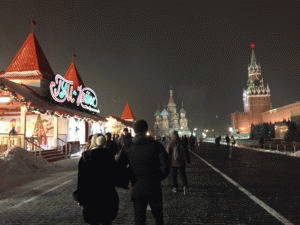
Red Square in Moscow with a winter festival to the left and the Kremlin to the right.
(Image by (Photo by Robert Parry)) Details DMCA
But the Browder's narrative also served a strong geopolitical interest to demonize Russia at the dawn of the New Cold War.
In the documentary's conclusion, Nekrasov sums up what he had discovered: "A murdered hero as an alibi for living suspects." He then ponders the danger to democracy: "So do we allow graft and greed to hide behind a political sermon? Will democracy survive if human rights -- its moral high ground -- is used to protect selfish interests?"
But Americans and Europeans are being spared the discomfort of having to answer that question or to question their representatives about the failure to skeptically examine this case that has pushed the planet on a course toward a possible nuclear war.
Instead, the mainstream Western media has hurled insults at Nekrasov even as his documentary is blocked from any significant public viewing.
Despite Browder's professed concern about the London libel case that he claimed was an attempt "to stifle our freedom of expression," he has sicced his lawyers on anyone who might be thinking about showing Nekrasov's documentary to the public.
The documentary was set for a premiere at the European Parliament in Brussels in April 2016, but at the last moment -- faced with Browder's legal threats -- the parliamentarians pulled the plug. Nekrasov encountered similar resistance in the United States. There were hopes to show the documentary to members of Congress but the offer was rebuffed. Instead a room was rented at the Newseum near Capitol Hill.
Browder's lawyers then tried to strong arm the Newseum, but its officials responded that they were only renting out a room and that they had allowed other controversial presentations in the past.
"We're not going to allow them not to show the film," said Scott Williams, the Newseum's chief operating officer. "We often have people renting for events that other people would love not to have happen."
In an article about the controversy in June 2016, The New York Times added that "A screening at the Newseum is especially controversial because it could attract lawmakers or their aides."
One-Time Showing
So, Nekrasov's documentary got a one-time showing with a follow-up discussion moderated by journalist Seymour Hersh. However, except for that audience, the public of the United States and Europe has been essentially shielded from the documentary's discoveries, all the better for the Magnitsky myth to retain its power as a seminal propaganda moment of the New Cold War.
After the Newseum presentation, a Washington Post editorial branded Nekrasov's documentary Russian "agit-prop" and sought to discredit Nekrasov without addressing his many documented examples of Browder's misrepresenting both big and small facts in the case.
Instead, the Post accused Nekrasov of using "facts highly selectively" and insinuated that he was merely a pawn in the Kremlin's "campaign to discredit Mr. Browder and the Magnitsky Act."
Like the recent Daily Beast story, which falsely claimed that Nekrasov let the Russian police officer Karpov play himself, the Post misrepresented the structure of the film by noting that it mixed fictional scenes with real-life interviews and action, a point that was technically true but willfully misleading because the fictional scenes were from Nekrasov's original idea for a docudrama that he shows as part of explaining his evolution from a believer in Browder's self-exculpatory story to a skeptic.
But the Post's deception -- like the Daily Beast's falsehood -- is something that almost no American would realize because almost no one has gotten to see the film.
Next Page 1 | 2 | 3 | 4 | 5 | 6
(Note: You can view every article as one long page if you sign up as an Advocate Member, or higher).





